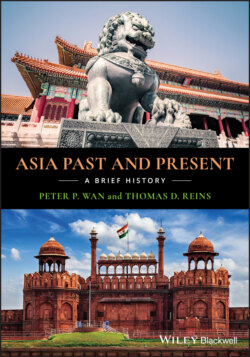Читать книгу Asia Past and Present - Peter P. Wan - Страница 9
Оглавление
Acknowledgments
Peter P. Wan
To my professors at Harvard University: Akira Iriye, Stephan Thernstrom, and the late Sacvan Bercovitch. Given my educational background, I would never have been able to complete my doctorate without their detailed and sustained guidance.
To William Cai, who provided indispensable research assistance.
Thomas D. Reins
To my Asian history professors, who guided me through the broad array of Asian cultures. My understanding of South Asia was greatly enhanced by decades of discussion with my colleague, the late Professor Seymour Scheinberg, whose study of and travels to India and the Himalayan nations gave me firsthand insights into the region; and to the late Alan Greenberger, whose classes on Indian history and culture provided an exciting and stimulating intellectual background for a lengthy and complex culture. Michael Onorato’s Southeast Asian classes during those Vietnam War years presented insightful and thorough lectures on colonialism, its demise, and modernization issues that followed. My East Asian academic mentors are numerous. For Japan, I am indebted to Kinji Yada for his informative lectures and decades of discussion about Japan and life and culture beyond Asia; to Peter Duus, whose Tokugawa and Meiji seminar opened my eyes to the intricate and turbulent relationship between economic and political modernization; and to Gordon Berger, whose Taisho and Showa seminar afforded me a nuanced look into the impact of democracy, the depression, world war, and recovery in Japan. My training in Chinese history began with Linda Pomeranz’s class in Modern China; in Taiwan, I had the opportunity to hear the lectures of Hsu Cho‐yun on Zhou Dynasty socioeconomic change; the late Lloyd Eastman grounded me in nineteenth‐century China in his materials seminar that included essential monographs and weekly discussions of them; Jerry Dennerline’s class on premodern China afforded me a look at the tradition I needed to appreciate in order to understand the problems of the nation’s modernization. And finally I owe a debt of gratitude to Arthur Rosenbaum, whose classes and reading seminars better prepared me for my research, and who as my dissertation advisor provided sage advice, which came quickly with each chapter I submitted to him.
I would also like to recognize three other mentors in my learning process. To Nelson Woodard, whose classes and seminar on American Foreign Policy were all models of meticulous academic preparation and delivery. David Pivar’s seminar on Historical Thinking made me think, probably for the first time seriously, about historical thinking. And to Bob Leonard, who serves as a model of the patient teacher who persistently guides and motivates the plodding student.
The chapters of the text that I wrote—those beyond China, Japan, and Korea—benefitted from the careful reading and valuable commentary of Professor Jackson Putnam. His constant encouragement pushed me forward year by year. I appreciate as well the comments of Professor Laichen Sun, who kindly read and commented on some of the early iterations of my Southeast Asia writings. To both I extend my appreciation, though I alone am responsible for the final written product.
We also wish to thank two anonymous reviewers for their comments and suggestions regarding the organization and content of the manuscript. They helped us to add, subtract, or merge materials and to clarify numerous descriptions of people, places, and ideas. We furthermore need to acknowledge our appreciation for the work of Mr. Patrick Davison and Mr. Bo Kent, Internet wizards, for the electronic expertise they provided to an older, electronically clumsy generation.
